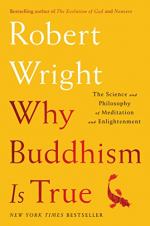|
This section contains 966 words (approx. 3 pages at 400 words per page) |

|
What does Wright believe about not-self amid the debate and controversy?
After reading the Buddha's discourses on the five aggregates of the self, Wright does believe in the concept of not-self. He also does believe that this is the viewpoint that the Buddha espouses as well. In response to the controversy, he admits that the Buddha never explicitly negated the existence of the self, but is unsure as to whether or not that is truly significant. He concludes that one must simply attempt to move toward not-self through meditation.
What is Wright’s most transformative meditation experience?
He sees orange and purple visuals on an occasion near the end of one of the meditation retreats which he attends. Throughout the retreat, his self-critical voice had popped up constantly, especially when his mind wandered from his breath. Though he had always identified the voice, this time something changed...
|
This section contains 966 words (approx. 3 pages at 400 words per page) |

|



